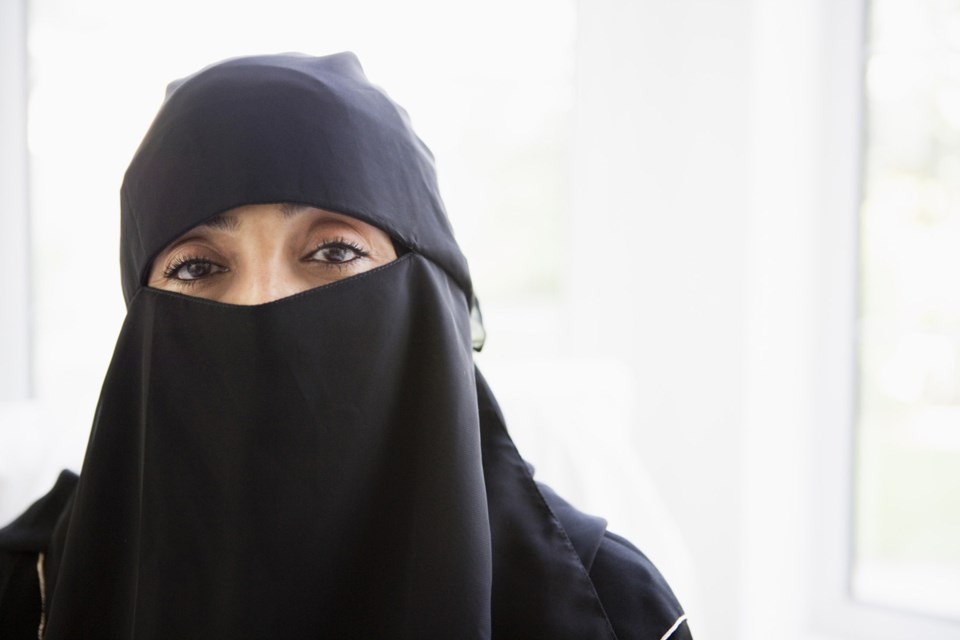Forget the environment, the economy, health care, transit, or jobs. It seems our entire federal election now turns on the issue of how and when a woman should reveal her face. Putting aside for a minute the distressing fact that the Conservatives’ pandering to prejudice appears to be working in their favour, I’ve been heartened to see many pundits defend Zunera Ishaq’s right to wear her niqab at her citizenship ceremony.
But something is missing in the discussion of the federal court ruling. There seems to be an underlying sentiment that although Muslim women have the right to keep their faces covered, the fact they would choose to do so should be cause for alarm. Indeed it should, but not in the way it has been positioned in this debate.
Even some of Ishaq’s supporters seem to find the niqab “creepy” and un-Canadian. They would rather ponder whether “barbaric culture practices” may be at play behind her choice — even unconsciously — than why a woman living in mainstream Canadian society might want to conceal herself from public view.
Few seem to give credibility to Ishaq’s consistent claims that she chooses the niqab so that she might be taken at something other than face value. No one seems interested in exploring how a garment many see as symbolic of women’s oppression might, to her, be symbolic of freedom.
You see, when you are a woman, particularly a younger one, to go about the world minding your own business means being the subject of constant scrutiny. People aren’t shy about sharing their opinions of whether your preferred mode of sartorial self-expression aligns with their subjective notions of femininity.
Too revealing and you are a slave to a culture that commodifies women’s bodies. Too modest and you lack independence. The fact that any two people might place the same outfit on either side of the spectrum never seems to enter into the debate. Tight pants or turtlenecks, high heels or hijab, you just can’t win. Might as well do what is right for you and call it a day.
Except that’s easier said than done. It is exhausting to navigate the world on the defensive. I can completely understand why for some women, self-respect means opting out by hiding their bodies from public view. Indeed, there have been many times when I have wanted to do the same. Each time I feel the hot stare of strange man boring into my back, or other body parts, on public transit, I wish I could hide.
Every time a man grabs at me at a bar, or trails me on my walk home, or aggressively shouts at me what he thinks of my body, my clothing, or the way that I walk, I do my best to disappear. We may like to think that in our modern society women are free to be in the world wearing whatever they want without repercussions. The reality is no matter what we wear, our bodies are seen as symbols of one sort or another.
Often our mere presence in public is viewed as an invitation to judge, to comment, to touch. The most steel-hearted among us still find ourselves zipping up coats, pulling down hemlines and crossing the street to avoid situations that are mildly annoying at best, dangerous at worst.
That is while we’re young. Once we cross a certain threshold, many women are no longer seen at all. To merit notice in our culture, we must appear youthful. To merit respect, we must strike an impossible balance between the Madonna and the whore. When we inevitably fail to hit this shifting and subjective target, the response is often vicious.
Ishaq and other women who wear the niqab know this far better than me. They are dealing with racism on top of plain old sexism. The fact they stick to their guns despite the threat of physical harassment and constant discrimination is admirable. To me, it shows they have more than your average helping of independence, confidence and resolve. To question their agency, even in their defence, is insulting to women, both old stock and new. To think Canada is a society so advanced that women should never feel they have a reason to hide is utterly naïve.
The outcry over the niqab is proof enough of that. The fact that, in 2015, an article of women’s clothing can still incite something akin to a modern day witch-hunt — and one that’s poised to determine the outcome of a federal election, no less — just goes to show which barbaric cultural practices are really at play.
@jm_barrett



